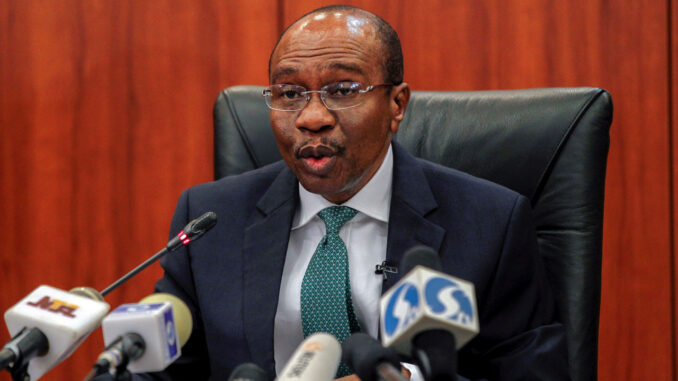
THE fresh warning by the Central Bank of Nigeria to individuals who spray the naira at social events, crumple, fold or write on the notes has again exposed the culture of impunity permeating the country’s national life. The apex bank in a statement vowed to prosecute abusers of the naira in collaboration with other regulatory and law enforcement bodies such as the Nigeria Police, Federal Inland Revenue Service, the Economic and Financial Crimes Commission and the Nigerian Financial Intelligence Unit. It is a good step, but this is not the first time the regulator is issuing this warning. The question is whether it can enforce its writ this time.
The economy loses so much from this aberration. The CBN deplored the activities of persons, who flagrantly debase the legal tender by hurling wads of naira notes in the air and stamping on the currency at social functions. “It should be stated that, contrary to the practice of these unpatriotic persons, it is neither cultural nor moral, for people to disrespect the currency which citizens trade in. For the avoidance of doubt, Section 21(3) of the Central Bank of Nigeria Act 2007 stipulates that ‘spraying of, dancing or marching on the naira or any note issued by the bank during social occasions or otherwise howsoever shall constitute an abuse and defacing of the naira or such note and shall be punishable under the law by fines or imprisonment or both.” This is the law, but does the CBN have the political will to enforce it?
Indeed, the CBN’s warning has become jejune. It is a worn-out mantra. It regularly pollutes the public space like a putrid odour foreshadowing opprobrium regarding the notorious abuse of the naira by the promoters of the profligacy.
The average bank customer hardly ever gets fresh naira notes from the bank. Instead, influential socialites who have access to new naira notes flaunt them at events by either bathing praise-singing musicians with the currency or ostentatiously spraying hosts at social gatherings. But none of them has been prosecuted by the bank through its Act, which empowers it to do so.
It appears that since the culture of lawlessness is also disturbingly rampant among high-ranking politicians and prominent business figures, the CBN usually faces difficulty tackling the menace. Weddings of children of top public officers and social events of wealthy private citizens have become avenues to mishandle the naira and to openly display waste and affluence. Videos abound on social media of how naira notes were turned into doormats and subjected to unthinkable use by hosts and their guests at gaudy ceremonies.
In 2020, during the wedding of a son of a senior cabinet minister, naira notes were displayed in abundance and sprayed on the couple for all eyes to marvel at the ostentatious spectacle.
Security agents serving as guards to Nigerian ‘big men’ carry huge amounts of money for them to destinations and event centres for distribution to hangers-on and supporters. Yet, there is a law limiting the amount of cash anyone can carry around in Nigeria. This is a law that exists only on paper.
Under the Conditional Cash Transfer programme, the Federal Government officials moved around the states to distribute cash to the poor and vulnerable households. Though some beneficiaries under the empowerment scheme got paid via transfers, the majority were unbanked, so the money was handed to them in cash. But they could have been issued cheques and that would spur them to patronise banks. That is another means to deepen financial inclusion. It is a troubling reality in Nigeria that those who make laws do not obey them. Public officials cannot disobey laws flagrantly and expect citizens not to copy them. The law ought not to be a respecter of anyone and everyone should be equal before it.
The naira hawkers also despoil banknotes. Bank cashiers are heavily liable: when counting cash, they write on the currency. This is absurd. But in some states, some of the hawkers have been nabbed and prosecuted by the police. The same treatment should be extended to those whose pastime is to deface the naira. This will send a strong warning that the practice would no longer be tolerated. The act soils and mutilates banknotes and the message should be clear that the naira must be handled with care the way they do foreign currencies.
The apex bank spends a lot of money on the production and issuance of banknotes. It costs money to re-issue banknotes after disposing of unfit ones. Despite several payment platforms and the cashless policy, many people still use cash for transactions. This, the CBN notes, continues to rise despite technological progress. It states that currency volume at the end of 2012 rose considerably by 10.34 per cent by half of the year 2018, adding that many of the notes were dirty, mutilated, not fit-for-ATMs and over-the-counter-payments. The CBN should increase advocacy and sensitisation to ensure the buy-in of Nigerians into its Clean Notes Policy designed to guarantee clean and high-quality banknotes in circulation.
The CBN needs to focus on initiatives to safeguard the naira in its drive to ensure circulation of quality banknotes and withdrawal of unfit naira notes. It is also vital for it to treat the root cause rather than symptoms. The CBN should be truthfully intentional in joining forces with the security forces to curb the mindset. Nigerians who have a penchant for mishandling the naira should be aware that there is nothing cultural or social in abusing banknotes. It is purely adversative, and the act should be discarded forthwith.
END

Be the first to comment